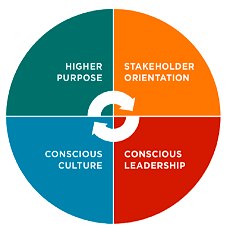I flew up to Boston for the Conscious Capitalism® Conference last year out of curiosity, not with the expectation that two days of speakers and conference hobnobbing would shift my work and life. But it did. It offered up a community, framework, and lexicon that were both inherently natural and alluringly new.
This year’s conference, held in San Francisco, begins Friday, April 5th and continues through the 6th with hands-on practicums where you can learn alongside founders of Method, Whole Foods, the Container Store, and B Lab, among others. Rather than urging you to join the event, I decided to share how it shaped my last year and direct you to 10 takeaways from 2012. Registration for the event is nearly capped but there are still some slots. (And if you’ll be in the city, send me an email to come meet me for a drink.)
1. Conscious Capitalism gave me a broader framework in which to think about business and social impact.
My work before primarily focused on external outputs: how can a company positively impact its suppliers, consumers, community, or environment? But I realized that looking only at external outputs is incomplete. It’s the systems, policies, culture, practices and values within a company that make possible any positive outputs like reduced waste or strong supplier  relationships. To maximize impact, it’s critical to first understand and be able to work with company culture and systems. Put another way: as humans, we inherently want the same positive outcomes for our lives and world. When we build the systems and the culture to allow us to practice these inclinations, we see positive outputs, such as more equally distributed pay or increased employee education. This evolution of understanding has impacted the nature of my work, the clients with whom I choose to work, and the writing I do.
relationships. To maximize impact, it’s critical to first understand and be able to work with company culture and systems. Put another way: as humans, we inherently want the same positive outcomes for our lives and world. When we build the systems and the culture to allow us to practice these inclinations, we see positive outputs, such as more equally distributed pay or increased employee education. This evolution of understanding has impacted the nature of my work, the clients with whom I choose to work, and the writing I do.
2. I’ve built community.
The quality of conversations I had at last year’s conference was so high (and so honest) that I wanted more when I returned home to Washington, D.C. To find and create these conversations, I organized an event for Conscious Capitalism businesses, practitioners and enthusiasts. Although I’ve since moved to San Francisco (more on this below), people from the event remain in touch and are actively growing the D.C. community. To kick off the next week’s conference, I’m co-hosting a reception and dialogue focused on women in Conscious Capitalism. The event is open to both men and women. Please join us if you’ll be in town!
3. I’ve become more conscious.
Admittedly, I just wrote this and wanted to delete! and replace it with another outcome, but I’m forging ahead in honesty. Being exposed to people who were leading engaging, intentional lives helped me to think more intentionally about my own and to recognize the choice I have in it and the responsibility of this choice. I switched my environment, moving back to California. I switched how I relate to and engage clients. It’s no longer just about delivering product; I’m now more attuned to the motivations, concerns, and fears of the entrepreneurs and executives I work with. By understanding these, we’re able to make deeper shifts than we would have if we only focused on creating a partnership strategy and pipeline, for example. And I meditate. Ninety-five percent of our days seem directed by outside stimuli so I take some time each morning to turn inward.
~~~
Having shared all this, I should be clear that the intent of the Conscious Capitalism Conference isn’t personal transformation (that is, no fire walking sessions). It’s designed for business owners, executives, and nonprofits to learn to apply the principles of Conscious Capitalism. The speaker roster reflects this pragmatic approach: John Mackey, CEO of Whole Foods; Casey Sheahan, CEO of Patagonia; Eric Ryan and Adam Lowry, co-founders of Method; Kip Tindell, CEO of the Container Store; Liz Maw, Executive Director of NetImpact; Teju Ravilochan, co-founder of the Unreasonable Institute; and Jay Coen Gilbert, co-founder of B Labs, among others.



















